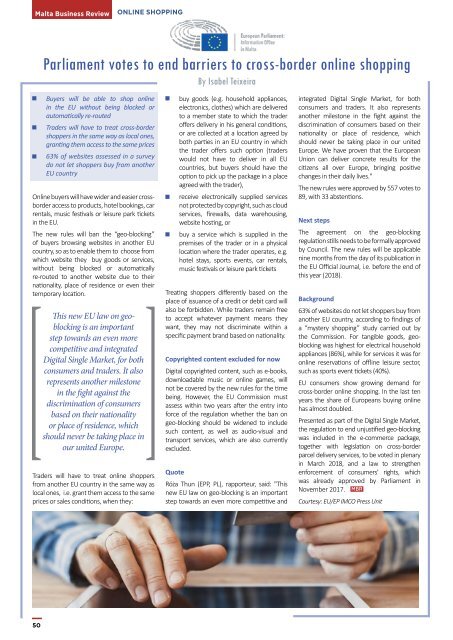Create successful ePaper yourself
Turn your PDF publications into a flip-book with our unique Google optimized e-Paper software.
Malta Business Review<br />
ONLINE SHOPPING<br />
Parliament votes to end barriers to cross-border online shopping<br />
By Isabel Teixeira<br />
• Buyers will be able to shop online<br />
in the EU without being blocked or<br />
automatically re-routed<br />
• Traders will have to treat cross-border<br />
shoppers in the same way as local ones,<br />
granting them access to the same prices<br />
• 63% of websites assessed in a survey<br />
do not let shoppers buy from another<br />
EU country<br />
Online buyers will have wider and easier crossborder<br />
access to products, hotel bookings, car<br />
rentals, music festivals or leisure park tickets<br />
in the EU.<br />
The new rules will ban the “geo-blocking”<br />
of buyers browsing websites in another EU<br />
country, so as to enable them to choose from<br />
which website they buy goods or services,<br />
without being blocked or automatically<br />
re-routed to another website due to their<br />
nationality, place of residence or even their<br />
temporary location.<br />
This new EU law on geoblocking<br />
is an important<br />
step towards an even more<br />
competitive and integrated<br />
Digital Single Market, for both<br />
consumers and traders. It also<br />
represents another milestone<br />
in the fight against the<br />
discrimination of consumers<br />
based on their nationality<br />
or place of residence, which<br />
should never be taking place in<br />
our united Europe.<br />
Traders will have to treat online shoppers<br />
from another EU country in the same way as<br />
local ones, i.e. grant them access to the same<br />
prices or sales conditions, when they:<br />
• buy goods (e.g. household appliances,<br />
electronics, clothes) which are delivered<br />
to a member state to which the trader<br />
offers delivery in his general conditions,<br />
or are collected at a location agreed by<br />
both parties in an EU country in which<br />
the trader offers such option (traders<br />
would not have to deliver in all EU<br />
countries, but buyers should have the<br />
option to pick up the package in a place<br />
agreed with the trader),<br />
• receive electronically supplied services<br />
not protected by copyright, such as cloud<br />
services, firewalls, data warehousing,<br />
website hosting, or<br />
• buy a service which is supplied in the<br />
premises of the trader or in a physical<br />
location where the trader operates, e.g.<br />
hotel stays, sports events, car rentals,<br />
music festivals or leisure park tickets<br />
Treating shoppers differently based on the<br />
place of issuance of a credit or debit card will<br />
also be forbidden. While traders remain free<br />
to accept whatever payment means they<br />
want, they may not discriminate within a<br />
specific payment brand based on nationality.<br />
Copyrighted content excluded for now<br />
Digital copyrighted content, such as e-books,<br />
downloadable music or online games, will<br />
not be covered by the new rules for the time<br />
being. However, the EU Commission must<br />
assess within two years after the entry into<br />
force of the regulation whether the ban on<br />
geo-blocking should be widened to include<br />
such content, as well as audio-visual and<br />
transport services, which are also currently<br />
excluded.<br />
Quote<br />
Róża Thun (EPP, PL), rapporteur, said: "This<br />
new EU law on geo-blocking is an important<br />
step towards an even more competitive and<br />
integrated Digital Single Market, for both<br />
consumers and traders. It also represents<br />
another milestone in the fight against the<br />
discrimination of consumers based on their<br />
nationality or place of residence, which<br />
should never be taking place in our united<br />
Europe. We have proven that the European<br />
Union can deliver concrete results for the<br />
citizens all over Europe, bringing positive<br />
changes in their daily lives."<br />
The new rules were approved by 557 votes to<br />
89, with 33 abstentions.<br />
Next steps<br />
The agreement on the geo-blocking<br />
regulation stills needs to be formally approved<br />
by Council. The new rules will be applicable<br />
nine months from the day of its publication in<br />
the EU Official Journal, i.e. before the end of<br />
this year (2018).<br />
Background<br />
63% of websites do not let shoppers buy from<br />
another EU country, according to findings of<br />
a “mystery shopping” study carried out by<br />
the Commission. For tangible goods, geoblocking<br />
was highest for electrical household<br />
appliances (86%), while for services it was for<br />
online reservations of offline leisure sector,<br />
such as sports event tickets (40%).<br />
EU consumers show growing demand for<br />
cross-border online shopping. In the last ten<br />
years the share of Europeans buying online<br />
has almost doubled.<br />
Presented as part of the Digital Single Market,<br />
the regulation to end unjustified geo-blocking<br />
was included in the e-commerce package,<br />
together with legislation on cross-border<br />
parcel delivery services, to be voted in plenary<br />
in March 2018, and a law to strengthen<br />
enforcement of consumers' rights, which<br />
was already approved by Parliament in<br />
November 2017. MBR<br />
Courtesy: EU/EP IMCO Press Unit<br />
50

















